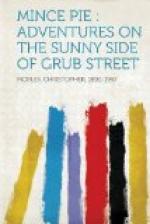He waved his hand with a benign patriarchal gesture and was gone.
ON DOORS
The opening and closing of doors are the most significant actions of man’s life. What a mystery lies in doors!
No man knows what awaits him when he opens a door. Even the most familiar room, where the clock ticks and the hearth glows red at dusk, may harbor surprises. The plumber may actually have called (while you were out) and fixed that leaking faucet. The cook may have had a fit of the vapors and demanded her passports. The wise man opens his front door with humility and a spirit of acceptance.
Which one of us has not sat in some ante-room and watched the inscrutable panels of a door that was full of meaning? Perhaps you were waiting to apply for a job; perhaps you had some “deal” you were ambitious to put over. You watched the confidential stenographer flit in and out, carelessly turning that mystic portal which, to you, revolved on hinges of fate. And then the young woman said, “Mr. Cranberry will see you now.” As you grasped the knob the thought flashed, “When I open this door again, what will have happened?”
There are many kinds of doors. Revolving doors for hotels, shops and public buildings. These are typical of the brisk, bustling ways of modern life. Can you imagine John Milton or William Penn skipping through a revolving door? Then there are the curious little slatted doors that still swing outside denatured bar-rooms and extend only from shoulder to knee. There are trapdoors, sliding doors, double doors, stage doors, prison doors, glass doors. But the symbol and mystery of a door resides in its quality of concealment. A glass door is not a door at all, but a window. The meaning of a door is to hide what lies inside; to keep the heart in suspense.
Also, there are many ways of opening doors. There is the cheery push of elbow with which the waiter shoves open the kitchen door when he bears in your tray of supper. There is the suspicious and tentative withdrawal of a door before the unhappy book agent or peddler. There is the genteel and carefully modulated recession with which footmen swing wide the oaken barriers of the great. There is the sympathetic and awful silence of the dentist’s maid who opens the door into the operating room and, without speaking, implies that the doctor is ready for you. There is the brisk cataclysmic opening of a door when the nurse comes in, very early in the morning—“It’s a boy!”
Doors are the symbol of privacy, of retreat, of the mind’s escape into blissful quietude or sad secret struggle. A room without doors is not a room, but a hallway. No matter where he is, a man can make himself at home behind a closed door. The mind works best behind closed doors. Men are not horses to be herded together. Dogs know the meaning and anguish of doors. Have you ever noticed a puppy yearning at a shut portal? It is a symbol of human life.




